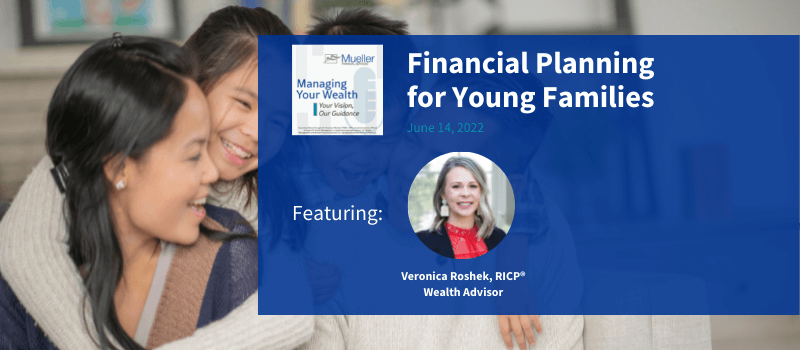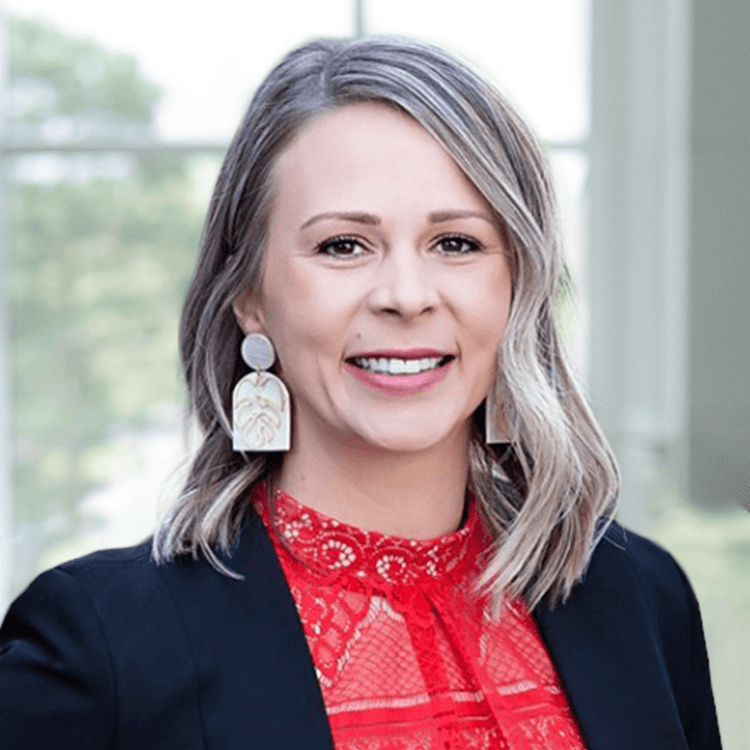
Podcast: Financial Planning For Young Families
By Mueller Financial Services, June 13, 2022
Join Veronica Roshek, RICP®, AIF®, Wealth Advisor, for an in-depth discussion on financial planning for young families. In this episode, she shares the differences in financial planning for young families, considerations when budgeting for young families, and how families can get help making decisions for their personal financial plan.
Listen Now:
For more information, please contact:

Veronica Roshek, RICP®, AIF®
Wealth Advisor
vroshek@muellersolutions.com
941.271.7182
EPISODE TRANSCRIPT:
[00:00:00] Ashley: Hi, I’m Ashley and you’re listening to the Mueller Financial Services’ podcast, “Managing Your Wealth: Your Vision, Our Guidance.” Today, we welcome Mueller Financial Services professional, Veronica Roshek, who will be joining us remotely, for a discussion on planning for young families. But before we begin, let’s find out more about our guest.
Veronica Roshek is a Retirement Income Certified Professional®, with four years of experience working in the financial services industry, along with a lifetime of experiences growing up as the daughter of a financial advisor. Veronica thrives on empowering business owners and individuals with tools to gain clarity and build direction for their financial picture.
Well, Veronica, thank you so much for your time today and thanks for joining the podcast.
[00:00:50] Veronica: Yes. Thanks so much for having me on. I’m excited to talk about this topic with you today.
[00:00:56] Ashley: It would be great if you could start off by telling us how financial planning for young families is different from other types of financial planning?
[00:01:02] Veronica: Yes, so, there is financial planning that can be specific to any sort of life stage or life events that could be going on, whether that’s personal or related to a business. When we’re speaking about young families in particular, that’s a time where there’s just a lot of changes and decisions that are being made.
So, when I think about young families and the families that I’m typically working with, the types of things that they’re having to consider, um, in their financial picture would be things like getting married, uh, planning for having a baby, adopting a child, maybe they’re blending families together.
There’s often times student loan debt. That’s a consideration or other types of debt. There’s usually a lot of financial decisions going on and it’s very different than maybe your typical financial planning you think of when you think of people that are nearing retirement.
At this stage in time for young families, young couples, talking about money and figuring out how to navigate those conversations can be one of the most difficult topics, uh, that is no surprise to anyone on this that’s listening into this, I’m sure. And so, when you’re thinking about trying to figure out how to navigate these topics, it’s really important to establish an open communication and to find ways to figure out how you’re able to get on the same page as far as what your goals are, what your values are, and how you’re going to be able to communicate through all of these different pieces of your financial picture, so that it doesn’t have to be a frustrating or difficult topic. And instead, can be something you’re working on together.
[00:02:51] Ashley: What should be considered when it comes to budgeting for young families?
[00:02:55] Veronica: So, when we think of the word budgeting, a lot of times people think of, oh gosh, I need to just itemize all of my expenses and that doesn’t sound like any fun, and I don’t want to figure out how I need to nickel and dime my coffee or going out to dinner on Friday night or whatever it happens to be. Really, what I like to think about and talk through when we’re planning budgeting for young families, especially when there’s a big life transition or maybe multiple life transitions happening in the same short timeframe, is getting a handle on where your money is currently, where your money needs to go, and where those obligations and where your goals lie as a whole.
And then in addition to that, you can really break it down into three different categories. One would be where your debt is. So, whether, again, that may be student loan debt and figuring out how to pay that off. Maybe you’re planning to buy your very first house. Maybe it’s saving for college for, for children, uh, and figuring out different ways that, you know, you’re trying to navigate both, paying off this debt and saving for, for future goals.
Your cashflow is also a piece of this. So, one thing that you can think about doing, if you’re in a stage where there is going to be a life transition, uh, it’s always a good idea to just audit your last expenses. You could take the last six months or the last 12 months and put them into any sort of software out there, mint.com, um, an Excel sheet is nice there’s also a good website called youneedabudget.com. That can be a good one to just do kind of a self audit pretty quick on where your expenses are going. Maybe you compare those with your, uh, spouses. And then, if there’s some change going on, that’s going to drastically change your expenses.
So, having a baby or getting into joint homeownership, blending children, families together, all of those pieces. Then, you can add those additional expenses into that budget and figure out what needs to change going forward. How can we adapt this budget so that we can either become successful going forward or so that we can just establish that good footing as things change to continue to be successful?
Uh, the last piece of budgeting would be, going back to savings. So, I mentioned, uh, saving for college. If there’s young children involved, that can be a piece of savings that is often top of mind, but really the foundation for savings should be thinking about having an emergency fund. Uh, it’s it’s a great place to start to try to work towards getting three to six months of living expenses saved up in an emergency fund account. Um, this should be something that could be different than what you think of as your general savings account or general emergency fund. Uh, especially if you’re someone that can make an emergency out of anything. Uh, if all of a sudden you unexpectedly need new tires. Well, it’s always a pain when we need some sort of big expense like that, that we then have to pay out. But these emergency fund savings should be for drastic, uh, different sorts of aspects that could create an emergency.
So, um, whether you know, something at work changes or a health situation changes, uh, where you, you may not be able to be making money or have to have some significant financial change for an aspect of time. So, I bring that up because, uh, likes to say that in general, as we’re thinking through budgeting and savings, it’s always a good idea to, to think through having some of those funds available for the things that are expected long-term expenses, but we don’t think about them always right in that moment. Um, and then the last piece of savings would be investment savings. And so, that could be retirement accounts if you’ve left a job, or if you’re, self-employed, there’s lots of other considerations that can go into where your investments are.
And oftentimes when you’re in this stage of life, there can be points in time where changing jobs is pretty common. And so, leaving a 401k where it was, is something that you should consider at least thinking through all of the options for what you could be doing with that money. Whether it’s rolling it over into an IRA account that is separate, or maybe it’s rolling those funds into your 401k at your new job. Uh, you can leave them at an old employer as well. Um, but that’s not always the most advantageous thing for the long run if your potentially going to be switching jobs multiple times through your life as most people, um, happen to be doing right now, this point in time, that’s something that’s certainly happening quite a bit.
Uh, in addition to, to that, that process, you could always, your fourth option is to cash out, uh, an old 401k when you leave a job. We highly discourage that and if you need the money for different reasons, whether it’s some of these reasons that have come up, getting married, having a baby, buying a new home, some of these big expenses, that’s something that, uh, we can always talk through trying to find the best avenue for finding those funds and saving for those, those big expenses.
[00:08:43] Ashley: When planning to have a baby, what else should be considered?
[00:08:47] Veronica: So, when you’re going to be having a baby, one of the biggest things that you should be considering is what your benefits are, most specifically, all of your insurance options. So, your health insurance, your disability insurance, your life insurance options that are offered through work. If you are employed somewhere that has a benefits package, or if you were combining those benefits with a spouse, or if you’re having to go and get them independently, because you’re self-employed.
So, when looking at those options, or health insurance, in particular, uh, usually you have an option to either get into a high deductible health plan that would have something called an HSA, health savings account, or a PPO plan. A PPO plan is usually something that you’re paying more out of pocket on a regular basis, but then your costs when you go to the doctor or to get a prescription are less expensive. Where as in a high deductible health plan, your monthly insurance costs are typically much lower, but then you’re saving dollars into an HSA on a tax-free basis. As long as you’re using those funds towards health related expenses. So, depending on your overall situation, it’s a really good time when you’re planning to have a baby to really do an audit of both of these options and make sure that you’re choosing the one that will be most advantageous to your picture.
It’s possible that in a given year of having a baby where if you have that planned out well, that one option may make more sense than the other on ongoing years or vice versa. So, it’s a good time to take a good look at that. Additionally, uh, disability and life insurance options. It’s good to know exactly what you have for disability.
There’s both short-term and long-term coverage. And that’s an important piece of the puzzle, because if you are unable to continue going to work, then that would be what could kick in to offer you a paycheck during a period of time where you’re unable to work due to medical reasons. Um, that coverage a lot of times, is about 60% for the longterm.
Uh, and it’s a good, it’s just a good thing to have in mind to know exactly what you have. If you don’t have any disability insurance coverage, then that could be something that you may want to consider adding to your picture depending on your overall, um, savings that you have as far as emergency savings go. So that, that can be an important consideration.
Another one is life insurance. And so a lot of times people think, uh, their coverage through work if they have that coverage again is sufficient. So, they may have about one and a half times salary through their work coverage. When you’re having a baby though, uh, and adding another uh, life into the picture. If you think about it, if, uh, you lost your spouse, or if you, yourself, something happened to you and you were no longer in the picture. About a year, year and a half of income, isn’t going to do a whole lot in the grand scheme of things to take care of that, uh, the wellbeing of that child for the duration of their life, especially when you’re probably also in a situation where other deaths are also high at that period of time.
Again, every situation is completely different, but this is a time when you have that additional planning related to bringing a child into the picture that having much more life insurance, oftentimes about 10 times your salary, plus any debts that are outstanding can be a better position to put yourself in, to be able to withstand, uh, there being no financial burden if something were to happen to you for, for the, uh, the raising of that child. We do have software options where we can pull this together, and be able to look at it in a picture specific to you to figure out what type of insurance and what length of time based on your individual plan and circumstances can make most sense for you to have.
Uh, the last piece that should be considered related to specifically having a baby, um, but could be also, uh, something that you should be considering as you’re getting married, as you’re buying a home would be estate planning. So, uh, it’s usually one of the last things that people, uh, think about in their picture, but this is a great time to think about getting this established.
That estate plan can be particularly important when you are having a baby. So, if something were to happen to both of you at the same point in time, then you are able to have that choice. You’re able to make those decisions on the forefront. Um, and there is no court process that then has to happen to decide who is going to continue to take care of that child going forward. It gives you that freedom of choice.
[00:14:09] Ashley: Another important topic that comes up for young families is college savings plans. What are the options and when should you start saving?
[00:14:16] Veronica: Yes. So, usually when I sit down and I’m meeting with a young couple, that either has a child on the way, or has young children, one of the very first things that they want to bring up is, we really want to make sure that we’re getting college savings prepared for. It’s a common thing.
Um, now college savings does not have to be part of your individual picture as far as what you’re saving for if you have children. There’s of course so many options now, avenues for children as they are exiting high school and making those decisions about long-term. But specific to college savings, there are lots of options out there.
One of the most common options is a 529 plan. Depending on what state you live in, there can be tax advantages to saving inside of a 529 plan, uh, where your state taxes are alleviated off of those funds. So, you would still pay the, the federal tax rate on your income, but the savings into a 529 plan, you would not have to pay state tax. In addition to that, as long as those funds are used for college related expenses, uh, or really what is qualified education expenses, as determined by the 529 plan. You can look that up specifically because there’s actually a lot of options related to different technical schools, um, and different, um, career paths programs that still have some form of formal education needed that still do fit the qualified education expenses that could be utilized for a 529 plan.
When, uh, you then go to use those expenses for that qualified educational expense at that point in time, as long as they flow straight to those education expenses, uh, all of the growth of those funds and the funds that have not been ran through state taxes, do not get taxed. They are essentially, tax free.
Uh, the other important factor there as well, what if my child doesn’t go to college and I’ve been saving for college all of these years. What happens to those funds? Well, in a 529 plans setting the individual that is doing the savings is actually the owner of that 529 plan and the child is the beneficiary.
So, if that particular individual ends up not deciding to go to college, you can switch the beneficiary of those funds to another child as long as it’s in the same family lineage. As you’re planning to save for college the only thing that I always want to caution or just recommend to young families as they’re dealing with all of the expenses at that point in time usually again, you know, the typical picture, not everyone’s includes the student loan debt, a new mortgage, you’re you’re paying for childcare expenses, you’re saving for your own retirement, you’re building your emergency fund, you’re paying the health costs of having a young child. All of these, um, additional expenses that are in your picture at that time, it’s really important that you’re also making sure that you’re taking care of yourself and not just the future of that child.
Uh, one way I like to, um, explain this to young families is if you think about when you get on an airplane, and if you’re sitting next to a young child and they go through the drill at the beginning, when you’re, when you’re on the plane of, if something is to happen and the air masks have to deploy, make sure you put your own air mask on first, before you help those around you, that need help.
It’s the same scenario when it comes to saving for the future. While it’s a really great thing to be saving for college for young children. It’s really important that you’re also taking care of yourself first and establishing those savings for yourself in addition to helping your child with their future savings.
[00:18:37] Ashley: How can a young family get help making all of these decisions for their personal financial plan?
[00:18:42] Veronica: Yes, so we are always a resource here to anyone. We love helping young families. I am always available to take phone calls on any of these topics or anything else that could fit into a financial picture related to planning for, um, any of these circumstances. So, whether it’s again having a baby, getting married, uh, buying that house, first house, those are things that we can help you with, um, help you work through. In addition to being able to just talk through that, we do offer a financial planning program called Genesis Planning.
Uh, Brennan Hollenbeck on our team has done another podcast on that specific topic. And that can be a really great way to establish that financial plan for you at that point in time and could be an important consideration in getting everything on track, as far as your goals and your values for how you want your overall financial picture to look going forward.
[00:19:50] Ashley: Well, this was a really great overview and thank you, Veronica, for your time today. Discussing planning for young families.
And thank you to our listeners. If you are interested to learn more about planning for young families or more about Mueller Financial Services in general, visit muellerfinancialsolutions.com. You can also follow the firm on LinkedIn at Mueller Financial Services, Inc. for more firm updates, insights, and upcoming events.
Securities offered through LPL Financial. Member FINRA/SIPC. Investment advice offered through IHT Wealth Management, a registered investment advisor. IHT Wealth Management and Mueller Financial Services, Inc. are separate entities from LPL Financial.
The opinions voiced in this podcast are for general information only and are not intended to provide specific advice or recommendations for any individual. To determine which strategies or investments may be suitable for you, consult the appropriate qualified professional prior to making a decision.
Podcast, Financial PlanningRelated Insights

May 23, 2023
Secure 2.0: Advantages for Women
ShareJoin Susan Garbarino, Principal / Wealth Advisor, and Veronica Roshek, Wealth Advisor, as they discuss the advantages of the Secure …
Read More navigate_next
May 2, 2023
Podcast: 8 Questions to Consider Before Buying Life Insurance – A Needs Analysis
ShareMay 2, is Life Insurance Day, and marks the anniversary of the first day that life insurance became available in …
Read More navigate_next